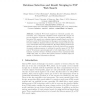Free Online Productivity Tools
i2Speak
i2Symbol
i2OCR
iTex2Img
iWeb2Print
iWeb2Shot
i2Type
iPdf2Split
iPdf2Merge
i2Bopomofo
i2Arabic
i2Style
i2Image
i2PDF
iLatex2Rtf
Sci2ools
DBISP2P
2005
Springer
2005
Springer
Database Selection and Result Merging in P2P Web Search
Intelligent Web search engines are extremely popular now. Currently, only commercial centralized search engines like Google can process terabytes of Web data. Alternative search engines fulfilling collaborative Web search on a voluntary basis are usually based on a blooming Peer-to-Peer (P2P) technology. In this paper, we investigate the effectiveness of different database selection and result merging methods in the scope of P2P Web search engine Minerva. We adapt existing measures for database selection and results merging, all directly derived from popular document ranking measures, to address the specific issues of P2P Web search. We propose a general approach to both tasks based on the combination of pseudo-relevance feedback methods. From experiments with TREC Web data, we observe that pseudo-relevance feedback improves quality of distributed information retrieval.
Related Content
| Added | 26 Jun 2010 |
| Updated | 26 Jun 2010 |
| Type | Conference |
| Year | 2005 |
| Where | DBISP2P |
| Authors | Sergey Chernov, Pavel Serdyukov, Matthias Bender, Sebastian Michel, Gerhard Weikum, Christian Zimmer |
Comments (0)

